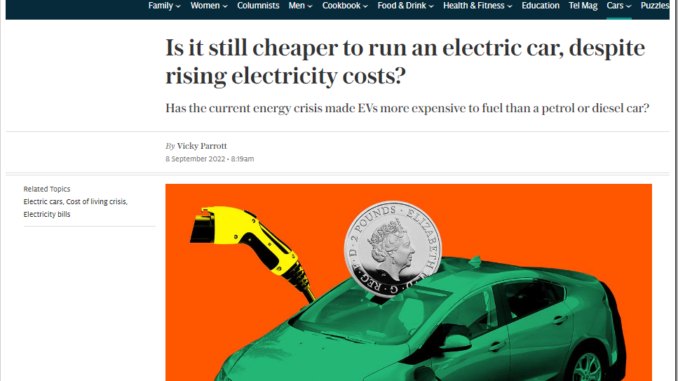
SEPTEMBER 8, 2022
tags: Electric Cars
By Paul Homewood
h/t Ian Magness
Bad news for EV drivers!
It won’t be news to anyone that energy prices have risen at a crippling rate in 2022 due to the ongoing energy crisis. The latest price rise will see the average household on a variable or default duel-fuel tariff pay an estimated average of £3,549 per year for electricity and gas; up from an estimated average of £1,971 based on summer 2022 prices.
This will impact some 24 million households in the UK who are on a default or variable dual-fuel tariff. It represents capped unit prices of 52 pence per kWh (p/kWh) plus a 46p per day standing charge for electricity. Gas will cost 15p/kWh, plus a daily standing charge of 28p per day, according to Ofgem figures.
Rates will vary depending on your provider, your tariff and how you pay. It is also worth noting that the price cap, which dictates energy prices across the UK, will be revised every three months as of 2023, and the industry predicts further rises.
With this huge hike in domestic utility costs, there’s an even greater focus on whether electric cars are still cheaper to fuel than petrol and diesel cars. Here, we’ll take a look at what it will cost to run an electric car (EV) after the October price rises.
You can calculate how much an EV costs to charge by multiplying your electricity price per kWh by the usable battery capacity of your car.
A Peugeot e-208, for instance, has a total 50kWh battery but only uses 46.2kWh of this (all car batteries ‘reserve’ some cells like this, in the interests of longevity). So, at the October 2022 rate of 52p/kWh it would cost £24.02 to “fill up” a Peugeot e-208 from empty. That’s up from £12.74 since April 2022, and £8.73 before that.
The Kia e-Niro has a longer driving range courtesy of a usable battery capacity of 64kWh, so a full battery would cost £33.28 – up from £17.92 as of summer 2022. The Mercedes EQS has one of the biggest batteries currently on sale, at 107.8kWh, and would cost £56.01 for a 100% charge.
Those on an Economy 7 tariff can halve those costs by charging between midnight and 7am, with companies such as EDF offering rates of between 25-30p per kWh during these hours.
It’s easy to set an electric vehicle to charge only during these hours via the car’s in-screen menus, or internet-enabled home chargers also offer controlled charging hours.
Many utilities providers have pulled low-cost EV specific tariffs from sale for the foreseeable future.
How do EV costs compare with petrol and diesel?
If you don’t utilise cheaper overnight electricity rates, at 52p/kWh, an electric car doing 3.2 miles/kWh (roughly speaking, a realistic real-world efficiency expectation for an EV such as the Volkswagen ID.3, Peugeot e-208, Tesla Model 3 et al) works out at around 16.25p per mile to fuel.
With petrol and diesel prices also suffering big rises in the last year, that’s compared to 19.6p per mile for a petrol car doing 40mpg on fuel costing £1.73 per litre, or 15.3p per mile for a diesel car doing 55mpg with pump prices of £1.85 per litre.
Essentially, this means than an electric car is no longer cheaper to fuel if you’re paying the prices set by the Ofgem price cap. Rather, it’s roughly on parity – perhaps slightly cheaper – than an efficient petrol car, while an efficient diesel will likely undercut the fuel costs per mile.
How much will an EV cost to rapid charge?
Public charging has always been more expensive than charging at home, and the rapid charging network has also seen big price rises for 2022. Most public charging networks have raised their rates, but it’s most telling on rapid chargers of 50kW or more, which now typically cost 60p/kWh or more where they were closer to 35p/kWh some 12 months ago. Prices do vary, of course.
Ionity charges 69p/kWh at its 350kW ultra-rapid chargers – which is actually unchanged from what it’s cost for some years, but it is still the most expensive rapid charging network, if also one of the fastest. bp Pulse currently charges 59p/kWh, while Shell has pegged its rates at 65p/kWh. Instavolt and Osprey both charge 66p/kWh. All of these rates are for non-subscription, pay-as-you go users, with nearly all public charge providers offering reduced unit rates for those who sign up and pay a monthly fee.
Most providers also offer preferential rates for subscribers, which can save up to 15p/kWh, so it’s often worth signing up and paying a low monthly fee to get cheaper electricity from any public charging network that you routinely charge at.
If we stick with 65p/kWh as an average price for contactless payment, non-subscription rapid charging in the UK, a 30kWh top-up (enough for a 20-80% top up of a 50kWh battery) will cost £19.50. At 3.2miles per kWh, that’s just over 20p per mile.
https://www.telegraph.co.uk/cars/advice/cheaper-run-electric-car-ev-bills-cost-rise-uk-2022/
The article makes one huge bloomer, because it ignores the fact that a large chunk of the petrol price is fuel duty, a tax that will still have to be paid in one form or another once we all have EVS. The price also includes VAT at 20% , as opposed to the 5% levied on electricity.
Once these taxes are taken into account, the price of diesel comes down to about £1.00 a litre, meaning running costs of 8 pence per mile. As the article notes, even home charging an EV works out at 16 pence per mile.
There are some other misleading statements, for instance:
Those on an Economy 7 tariff can halve those costs by charging between midnight and 7am, with companies such as EDF offering rates of between 25-30p per kWh during these hours.
There is no such thing as a free lunch, and anybody on Economy 7 will also be paying much more for the electricity they use during the day. For instance, I am with Octopus and current pay 27.35p/KWh; they offer a deal called Octopus GO, which charges 7.50p/KWh at night, but 38.82p/KWh during the day. (All of these rates are pre the October price hike). Overall some homeowners might be slightly better off with Economy 7, but the savings are likely to be tiny.
The article also claims that some cars like the Nissan Leaf now have similar prices to petrol cars. This is nonsense – the cheapest Leaf still comes in at £29290 OTR, about £8 to 10 grand more than petrol equivalents, and that is the 39 KWh version, which is useless as anything other than a city run around. The 59 KWh version will cost you £35240.
Bit by bit the wheels are falling off the electric car bandwagon.

